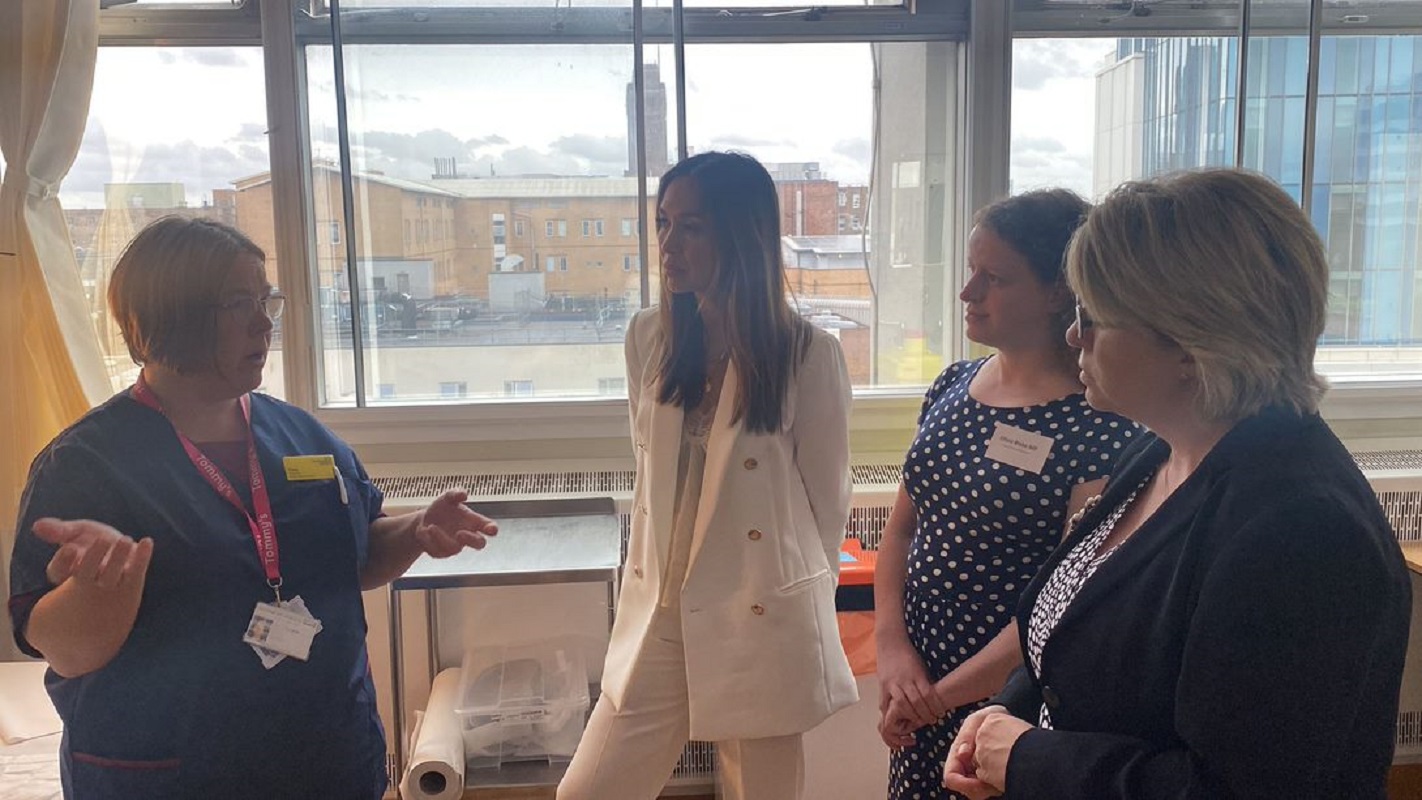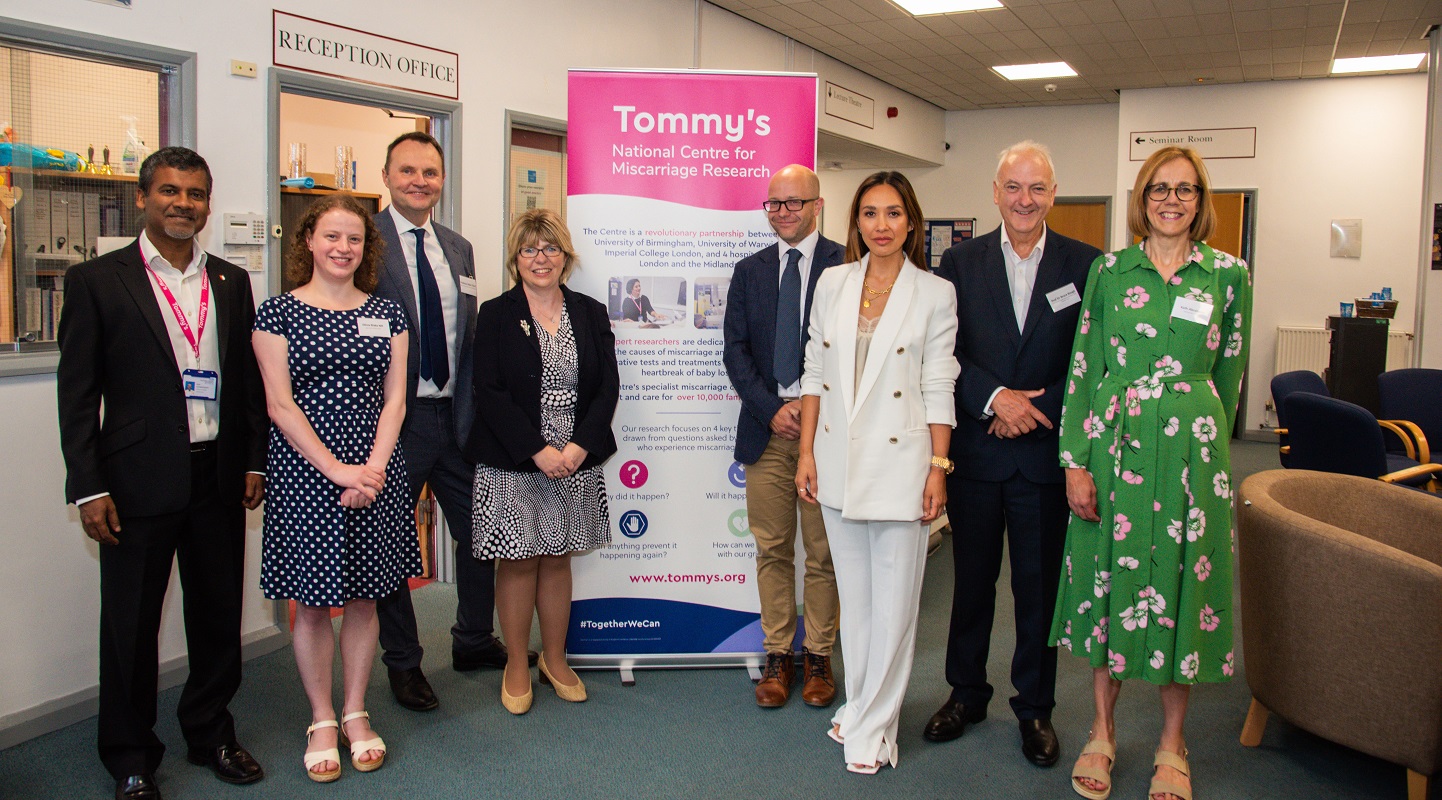Minister Maria Caulfield, Olivia Blake MP and Tommy’s Ambassador Myleene Klass visit our National Centre for Miscarriage Research
Their visit came ahead of the expected publication of the Pregnancy Loss Review this summer.
This independent report is expected to detail the impact of miscarriage and other forms of baby loss before 24 weeks’ pregnancy; set out recommendations to the Government for changes to the law for registering these losses; and also provide guidance on improving NHS gynaecology and maternity care for parents who experience a miscarriage and other causes of baby loss.
Ahead of its publication, we invited Maria Caulfield - Parliamentary Under Secretary of State (Minister for Women) and Parliamentary Under Secretary of State (Minister for Mental Health and Women’s Health Strategy) - to visit the Tommy’s National Centre for Miscarriage Research at Birmingham Women’s Hospital to find out about our latest miscarriage research as we work to improve families’ experiences and save babies’ lives.
Joining the Minister and her team were Labour MP and passionate campaigner for improvements in miscarriage care Olivia Blake, and Myleene Klass – one of our Tommy’s Ambassadors and a leading voice in calling for reform in care for all following her own 4 devastating losses.
The Tommy's National Centre for Miscarriage Research is a partnership between the University of Birmingham, University of Warwick and Imperial College London.
The Centre’s researchers and clinicians work across sites at the Birmingham Women’s and Children’s Hospitals and in London, Coventry and Warwick to better understand miscarriage and develop treatments which could prevent loss. They also run clinics for families who are referred for help in identifying and treating recurrent miscarriage.
Currently in the UK, women and birthing people must endure 3 miscarriages in a row before they qualify for specialist care and support. Our team at Birmingham are now piloting a new care pathway which offers support after a first loss, some testing and treatments after a second, and consultant-led care after a third: the Graded Model of Care.
They’ll be measuring its success on the number of medical conditions successfully identified through additional tests that take place, which most women and birthing people would not have access to until after a third loss. They’ll then be evaluating the pilot to assess whether it could be rolled out more widely, with the aim of a national introduction.
During their time at the Centre, the Minister, Olivia Blake MP and Myleene Klass visited the hospital’s Early Pregnancy Unit to see the Tommy’s Graded Model of Care pilot in action.
Alongside our Tommy’s representatives and those from the University of Birmingham, Birmingham Women's and Children's NHS Foundation Trust and the Department for Health and Social Care (DHSC), they also met with families whose lives have been changed by the research and care they received from Tommy’s.
Birmingham mum Jenene with baby London (pictured above), and Laura and Aaron from Kidderminster and their baby, William, met with our visitors to share their stories and explain how our research and care at the recurrent miscarriage clinic in Birmingham helped them bring their babies home.
In 2021 our research showing the serious impact of miscarriage in the UK and our recommendations to overhaul miscarriage care was published in The Lancet. It was the first time in the medical journal’s almost-200 years that an issue was dedicated to the subject of miscarriage.
Government provided initial support for the Miscarriage Matters recommendations in a 2019 Parliamentary Debate, which included the introduction of the Graded Model of Care and a call for the formal counting of miscarriages nationally and the setting of targets for reduction.
The findings were referenced in the Government's subsequent 2022 Women’s Health Strategy, alongside a commitment to improve miscarriage care.
Discussions to implement these recommendations are ongoing and we welcome the Minister’s visit as a step forward toward progress.
Kath Abrahams, Chief Executive of Tommy’s, said:
“For too long, miscarriage has been a hidden problem, treated by many as ‘just one of those things’. This means public resources and attention aren’t channelled towards a problem which is devastating in its impact. Research from our National Centre for Miscarriage Research has firmly challenged this narrative and shown there are things we can do to improve families’ experiences and save babies’ lives.
“I am delighted to have had the opportunity to meet Minister Maria Caulfield and showcase the difference we can make by changing the way miscarriage care is delivered.”
Professor Arri Coomarasamy OBE, Director of the Tommy’s National Centre for Miscarriage Research and Professor of Gynaecology and Reproductive Medicine at the University of Birmingham, said:
“I was delighted to host Minister Maria Caulfield today at the Tommy’s National Centre for Miscarriage Research and directly show the life-changing difference we can make when we dedicate resources to improve miscarriage care.
“We firmly believe no individual should have to experience three miscarriages before they access basic care and support. The new care guidelines we’ve created and implemented in a pilot study at Birmingham Women’s Hospital show how we can practically provide best practice care which is backed by the latest research. Now we need continued governmental support to make sure we can improve miscarriage care on a national scale, changing the experiences of the hundreds of thousands of families who experience this devastation every year.”
Matt Boazman, Chief Executive of Birmingham Women’s and Children’s NHS Foundation Trust, said:
“We are proud of the pioneering work done by the Tommy’s Centre for Miscarriage Research at Birmingham Women’s Hospital which is made possible by the strong partnerships between our Trust, the University of Birmingham and Tommy’s. We remain committed to providing excellent care for women and families at risk of miscarriage and supporting improvements across the country and internationally.”
Olivia Blake, MP for Sheffield Hallam, said:
"For too long, miscarriage has been swept under the carpet, dismissed as a 'fact of life'. As a result, research into the causes and treatment of miscarriage has never been prioritised or properly funded. The work Tommy's do at their centre is vital, helping to plug this hole, and it was an honour to get to see and hear about it first-hand and meet some of the staff, researchers and families who've been supported."
Myleene Klass said:
"I know first-hand how crucial it is that this issue is taken seriously by our Government. It’s unacceptable that women must currently experience 3 miscarriages before receiving any care. You wouldn’t wait for three heart attacks to get help.
"1 in 6 women will suffer a miscarriage but without data collection, we don’t know the real numbers behind those stats. I am using my voice today to represent all those who have been affected by miscarriage and welcome the Minister’s visit as the next step forward in Tommy’s campaign."

“Pregnancy loss can be hugely devastating and traumatic for women, their partners, and indeed entire families. That’s why today’s visit – and the work being carried out by Tommy’s – is so important.
“I spoke to women and families who have been supported by the centre, including its new approach to miscarriage care, and I’d like to thank them for sharing their stories and experiences.
“I’ll keep working to ensure women and their families can access the best possible care following complications in pregnancy. The independent review into pregnancy loss – the findings of which will be published shortly – will consider how we can improve care so women and families receive the support they need.”

Related content for you
-
Read more about 'Tommy’s experts support development of new Saving Babies’ Lives action plan '
Tommy’s experts support development of new Saving Babies’ Lives action plan
-
Read more about 'More investment in pregnancy research needed to reduce inequities '
More investment in pregnancy research needed to reduce inequities
-
Read more about 'Steps forward in developing a new miscarriage care model '
Steps forward in developing a new miscarriage care model
-
Read more about 'First Women's Health Strategy released '
First Women's Health Strategy released
